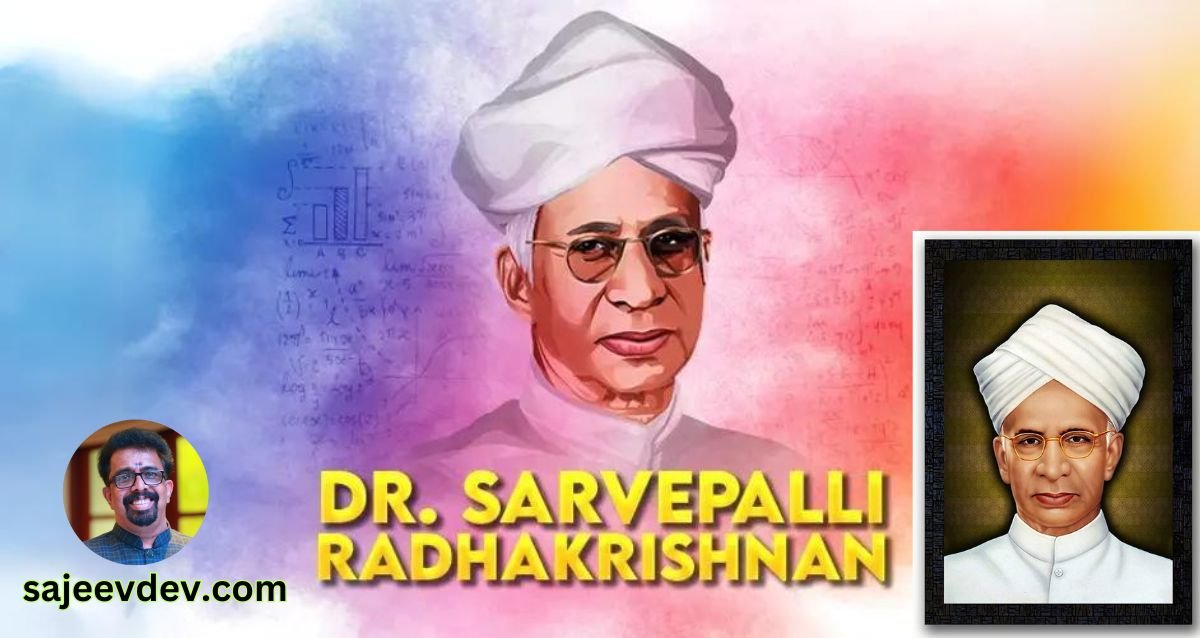Born on September 5, 1888, in the small town of Thiruttani in the Madras Presidency
Born on September 5, 1888, in the small town of Thiruttani in the Madras Presidency, Dr. Sarvepalli Radhakrishnan emerged from modest beginnings to carve a distinguished path in Indian history. Hailing from a devout Hindu family, Radhakrishnan’s upbringing was deeply rooted in religious and cultural traditions that shaped his early worldview and intellectual pursuits. His primary and secondary education were marked by remarkable scholastic achievements, setting the stage for his future academic endeavors.
Radhakrishnan’s journey in formal education began at the local school in Thiruttani, where his intellectual promise quickly became apparent. His aptitude for learning earned him a scholarship to attend the prestigious Madras Christian College, a pivotal step that would catalyze his academic career. Immersed in a rigorous and diverse academic environment, Radhakrishnan developed a deep interest in philosophy, which would later become his lifelong passion and field of expertise.
At Madras Christian College, Radhakrishnan’s academic brilliance shone brightly. He excelled in a wide array of subjects, but it was his profound understanding of philosophy that truly set him apart. His master’s thesis on Vedanta philosophy was a testament to his deep engagement with and insight into classical Indian thought. This work not only exemplified his scholarly capabilities but also laid the foundation for his future contributions to the world of philosophy.
The study of Vedanta, an ancient Indian philosophical tradition, was particularly significant for Radhakrishnan as it resonated with his cultural heritage while aligning with his quest for universal truths. His thesis, which meticulously analyzed the tenets of Vedanta, demonstrated his ability to synthesize complex concepts and articulate them with clarity and depth. This distinct intellectual journey not only cemented Radhakrishnan’s reputation as a formidable scholar but also paved the way for his future roles as an educator, philosopher, and statesman.
Academic and Philosophical Contributions
Dr. Sarvepalli Radhakrishnan’s illustrious academic and philosophical career is marked by his profound influence on Indian philosophy and his significant contributions to the broader field of philosophy. His tenure as a professor at several esteemed institutions is a testament to his intellectual prowess and dedication to philosophical inquiry. Dr. Radhakrishnan commenced his academic journey at the University of Mysore, where his teachings began to garner attention. His reputation solidified during his time at the University of Calcutta, where he continued to delve deep into philosophical discourses and expanded his influence within academic circles.
Perhaps one of the most notable phases of Radhakrishnan’s academic career was his appointment as the Spalding Professor of Eastern Religions and Ethics at the University of Oxford. This position not only underscored his academic brilliance but also facilitated a cross-cultural exchange of ideas, as he adeptly bridged Eastern and Western thought. His work during this period highlighted the universal relevance of Indian philosophy, particularly Vedanta, and showcased its contributions to global philosophical paradigms.
Radhakrishnan’s interpretation of Vedanta, a key element of his philosophical contributions, was instrumental in bringing Indian thought to the forefront of global philosophical discussions. His interpretations were both a preservation of traditional beliefs and an innovative examination that made Vedanta accessible and relevant to contemporary audiences. Through his scholarly works, he emphasized the integral aspects of Indian philosophy, elucidating its depth and practical applicability.
Among his noteworthy publications, ‘The Philosophy of Rabindranath Tagore’ and ‘Eastern Religions and Western Thought’ stand out. In these works, Radhakrishnan not only explored the philosophical underpinnings of Indian culture but also engaged in a comparative analysis with Western philosophies. His scholarly approach and philosophical insights have left an indelible mark on the academic world, portraying Indian philosophy as rich, profound, and universally significant.
India’s Vice President: A Decade of Service (1952-1962)
Dr. Sarvepalli Radhakrishnan’s tenure as the first Vice President of India, from 1952 to 1962, marked a transformative period in the country’s nascent democracy. Upon assuming office, the role of the Vice President was still in its formative stages, and Radhakrishnan played a pivotal role in framing its significance. His profound insights into political philosophy and statecraft were instrumental in shaping the vice-presidency into a pillar of strength and counsel for the Indian government.
Throughout his decade-long service, Radhakrishnan was a robust advocate for India’s interests on both the national and international fronts. He leveraged his vast knowledge and diplomatic acumen to navigate complex geopolitical landscapes. Internationally, Radhakrishnan’s contributions were invaluable; he participated in numerous diplomatic missions, where he tirelessly promoted India’s vision of peace, non-alignment, and coexistence during the early years of the Cold War. His speeches and interactions with world leaders were marked by eloquence and intellectual depth, enhancing India’s image as a sovereign, independent nation.
On the home front, Radhakrishnan was deeply involved in the legislative processes, providing critical oversight in the Rajya Sabha (Council of States) as its chairman. His tenure saw an emphasis on education reform, a sector he deeply cared about due to his academic background. He supported several policies aimed at strengthening higher education and fostered initiatives that advanced the cultural and scientific capacities of India.
Radhakrishnan’s vice-presidency was characterized by his unwavering commitment to ethical governance. He consistently promoted the idea that the morality and integrity of the nation were as crucial as its economic and political ambitions. His efforts laid a solid foundation for future officeholders, ensuring that the vice-presidency became an indispensable aspect of India’s democratic framework.
Presidency (1962-1967): National and International Leadership
In 1962, Dr. Sarvepalli Radhakrishnan was elected as the second President of India, marking the commencement of a significant era in the nation’s post-independence history. His term was characterized by a profound advocacy for education and a steadfast commitment to fostering unity and nation-building. Radhakrishnan, a philosopher with a deep understanding of human values, leveraged his intellectual prowess to navigate the complex political and social landscape of the time.
One of the pivotal moments during his presidency was the India-China war of 1962. Despite the military and political challenges posed by the conflict, Radhakrishnan emphasized the importance of solidarity and resilience among the Indian populace. His speeches, often laden with philosophical insights, aimed to inspire a sense of collective strength and fortified the nation’s resolve. He also called upon the international community to advocate for peace and diplomatic resolution, highlighting his role as a global statesman.
Radhakrishnan’s presidency also saw active engagement with global leaders. His interactions were marked by a vision to position India as a significant player on the world stage, advocating for peace and cooperation. His dialogue with leaders from various countries underscored the importance of international solidarity and mutual respect. Radhakrishnan’s contributions to global diplomacy were deeply influenced by his philosophical beliefs in universal brotherhood and the interconnectedness of all nations.
Domestically, Radhakrishnan was a firm believer in the power of education as a catalyst for nation-building. He consistently emphasized the need for educational reforms and the promotion of critical thinking among the youth. His tenure saw the establishment of several educational institutions and initiatives aimed at broadening access to quality education. This focus on education was integral to his vision of a progressive and enlightened India.
In essence, Dr. Sarvepalli Radhakrishnan’s presidency was a period of significant national and international leadership. His advocacy for education, commitment to unity, and engagement with global leaders left an indelible mark on India’s journey as a young and evolving democracy.
Ambassador to the Soviet Union (1949-1952)
Dr. Sarvepalli Radhakrishnan’s tenure as the Ambassador of India to the Soviet Union from 1949 to 1952 marked a critical period in the nascent stages of Indo-Soviet relations. At a time when the Cold War was intensifying, Radhakrishnan’s diplomatic prowess played a pivotal role in bridging the gap between India and the Soviet Union. With his profound understanding of international relations and cultural diplomacy, he navigated this complex geopolitical landscape with remarkable finesse.
Upon assuming the role of India’s second Ambassador to the Soviet Union, Dr. Radhakrishnan faced the intricate task of fostering mutual understanding amidst a relatively unfamiliar and politically charged environment. His strategic efforts were directed towards highlighting the shared cultural and historic ties between the two nations, thus laying a foundation for robust bilateral cooperation. By emphasizing cultural exchanges, he aimed to evoke a sense of kinship transcending ideological differences. This approach was instrumental in crafting a narrative of mutual respect and understanding.
One notable incident during his ambassadorship was his engagement in a series of cultural initiatives, such as organizing Indian cultural festivals in the Soviet Union. These events showcased India’s rich heritage and emphasized commonalities, fostering a sense of solidarity. Radhakrishnan’s philosophical outlook, rooted deeply in the idea of universalism, resonated well with the Soviet officials, aiding in the cultivation of goodwill. Furthermore, his eloquence and scholarly acumen during discussions often left a lasting impact, improving diplomatic rapport significantly.
Radhakrishnan’s diplomatic achievements were further evident in the signing of several bilateral agreements. These agreements encompassed economic cooperation, educational exchanges, and scientific collaborations, outlining a roadmap for a sustainable relationship between the two nations. His respectful yet assertive diplomacy helped in ensuring that India’s strategic interests were well-guarded, thus contributing to the long-term stability of Indo-Soviet relations.
In essence, Dr. Sarvepalli Radhakrishnan’s ambassadorship to the Soviet Union was a blend of philosophical diplomacy, cultural outreach, and pragmatic negotiations. His tenure not only strengthened the ties between India and the Soviet Union but also showcased the potential of diplomatic grace and intellectual rigor in navigating international relations.
Legacy in Education: Philosopher and Educator
Dr. Sarvepalli Radhakrishnan’s legacy in education is profound, reflecting his lifelong dedication to the advancement of knowledge and the upliftment of the educational system in India. His philosophy on education was deeply rooted in his belief that it serves as the cornerstone for individual and societal development. Dr. Radhakrishnan held that the purpose of education is not merely the acquisition of knowledge, but the cultivation of ethical and moral values. This holistic approach resonated through his teachings and writings, influencing many generations.
One of Dr. Radhakrishnan’s significant contributions to India’s educational landscape was his role in shaping educational policies. As a respected scholar and educator, he was instrumental in devising strategies that expanded access to quality education across the country. His vision emphasized the need for inclusivity and academic excellence, which eventually led to reforms that strengthened the foundational structures of India’s educational system.
Dr. Radhakrishnan’s influence extended to the establishment of key institutions such as the University Grants Commission (UGC). The UGC, formed in 1956, became a pivotal body in ensuring the proper functioning and accountability of higher education institutions in India. Under his guidance, the UGC aimed to promote and coordinate university education, ensuring that academic standards were maintained and resources judiciously utilized to enhance learning and research.
In addition to institutional reforms, Dr. Radhakrishnan championed the cause of teacher appreciation and welfare. His belief that teachers deserve the highest regard in society led to the establishment of Teacher’s Day in India, celebrated annually on his birthday, September 5th. This tradition underscores the vital role that educators play in nation-building and serves as a reminder of Dr. Radhakrishnan’s undying respect for the teaching profession.
Dr. Radhakrishnan’s contributions to educational reforms, policies, and teacher recognition left an indelible mark on India’s educational framework. His philosophical and practical efforts continue to influence contemporary educational practices, underscoring his status as a cornerstone figure in the history of Indian education.
Philosophical Impact and Literary Works
Dr. Sarvepalli Radhakrishnan, an eminent philosopher, made profound contributions to the understanding and interpretation of Hindu philosophy. Drawing from the Upanishads and the Bhagavad Gita, Radhakrishnan sought to present Hindu thought in a manner that resonated with contemporary thinkers. One of his central tenets was the idea of Advaita Vedanta, which posits the essential oneness of all existence. He believed that the essence of Hindu philosophy could be expressed through its universality, promoting a spiritual vision of the cosmos that transcends sectarian boundaries.
Radhakrishnan’s comparative studies of Eastern and Western philosophies are particularly noteworthy. He emphasized the need to bridge the gap between these traditions by spotlighting core similarities while respecting their distinct differences. In works such as “Eastern Religions and Western Thought,” he illustrated his adeptness at navigating complex philosophical landscapes, juxtaposing ideas from Indian metaphysics with those of Western thinkers like Plato and Kant. This comparative methodology not only showcased the depth of Indian philosophy but also fostered a deeper dialogue between the East and the West.
His literary contributions are both extensive and impactful. Among his significant works are “The Philosophy of Rabindranath Tagore,” where he delves into the mystical and philosophical underpinnings of Tagore’s poetry and literature, and “An Idealist View of Life,” which encapsulates his philosophical viewpoint, positing life as an integrated whole driven by an underlying spiritual force. In “The Hindu View of Life,” Radhakrishnan adeptly interprets Hindu thought for the modern mind, elucidating the religion’s metaphysical and ethical dimensions.
Radhakrishnan’s thoughts on religion, metaphysics, and ethics remain influential. He advocated for a religion rooted in personal experience and direct realization rather than dogma and institutional authority. His metaphysical views emphasized the continuity between the self and the universe, encouraging an ethical life that reflects this interconnectedness. Through his extensive body of work, Dr. Radhakrishnan established himself not only as a philosopher and statesman but also as a bridge-builder between diverse intellectual traditions.
Personal Life and Values
Dr. Sarvepalli Radhakrishnan was not just an intellectual luminary; his personal life and values were as influential as his professional achievements. Born on September 5, 1888, in a small village in Tamil Nadu, Radhakrishnan’s early life was marked by simplicity and diligence. His parents, Sarvepalli Veeraswamy and Sitamma, emphasized the importance of education and integrity, laying a strong foundation for the values he espoused throughout his life.
Radhakrishnan married Sivakamu, his distant cousin, in 1904. Their partnership was both a source of personal strength and intellectual companionship. The couple had six children, and Radhakrishnan was known to be a devoted family man. Despite his demanding career, he always made time for his family, instilling in them the same principles of ethics and hard work that he lived by.
Beyond his familial responsibilities, Radhakrishnan had a profound interest in literature, religion, and philosophy. His profound belief in the unity of all religions influenced his approach to politics and diplomacy. He often quoted scriptures and literary works to emphasize the moral and ethical underpinnings of his arguments. His personal library was extensive, reflecting a lifetime commitment to learning and intellectual growth.
Radhakrishnan’s adherence to values such as honesty, integrity, and compassion was evident in his public service. As a politician, he believed in serving with a sense of duty rather than using his position for personal gain. His approach to leadership was grounded in the conviction that the well-being of the nation superseded all individual interests. This moral compass guided his decisions, earning him immense respect on the global stage.
The personal philosophy of Dr. Sarvepalli Radhakrishnan, characterized by a synthesis of Eastern and Western thought, significantly influenced his political and diplomatic career. He viewed his role as an educator not just in academic terms but in a broader context of teaching moral and ethical governance. This blend of intellectual rigor and moral integrity made Radhakrishnan a revered figure, whose impact on Indian society and the world remains significant to this day.









